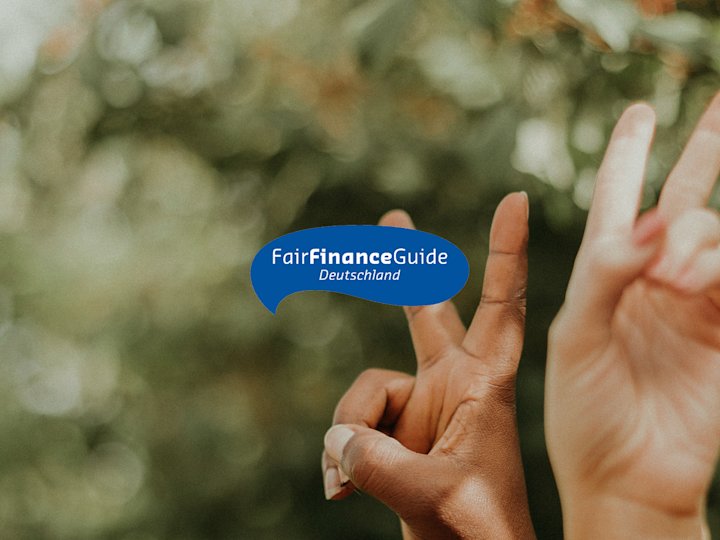How fair and sustainable are German banks really? This is what the Fair Finance Guide investigates every year. Find out how banks are assessed with regard to international sustainability standards and how Tomorrow has been rated.
What is the Fair Finance Guide Germany?
The Fair Finance Guide Germany is part of the Fair Finance International initiative. This association of organizations is committed to greater transparency and sustainability in the financial sector.
Since 2016, the Fair Finance Guide has been reviewing German banks concerning the criteria of environmental protection, human rights and anti-corruption, thus making an important contribution to transparency in the financial sector. To this end, the guide analyzes and evaluates publicly available data - such as annual reports or sustainability reports - of the banks.
Based on 286 criteria from 14 topics and sectors, 19 banks were assessed this year according to the extent to which their practices are in line with human and environmental rights. The topics examined were climate protection, corruption, gender equality, human and labor rights, nature & environment, taxes & transparency, and the sectors of armaments, food, forestry, mining, oil & gas and energy production.
The result of the analysis was then published in a ranking and is intended to help consumers as a guide when choosing their own bank. For many people - unless, like our customers, they have long since put their money on the good side - this guide is their first point of contact with the common business practices of banks. They receive information and background knowledge that helps them make a good decision that fits their values.
One limitation, however, is that only 19 banks were analyzed for the Fair Finance Guide 2023 and thus only a small part of the German banking landscape is represented. As the review of banks is an intensive and lengthy process, the initiators of the Fair Finance Guide have not (so far) been able to evaluate every bank. However, one or two new banks are included each year. Another limitation is the fact that participation is voluntary for all banks. Banks must agree to the assessment. However, it can therefore already be seen as positive that the losers of the ranking have agreed to the analysis.
With 91% of criteria fulfilled, Tomorrow takes 3rd place
We are participating for the first time in 2023 and, as a newcomer, we immediately made it to third place! And here we are in good company with GLS Bank in first place and Ethikbank in second place. For our (financial) decisions, we use the UN's Sustainable Development Goals, from which we have derived over 100 positive and negative criteria. We use these criteria, for example, for all our investment decisions and project funding.
Why are we new here, even though we've been around for a few years? Previously, we were excluded from the ranking because we did not meet the minimum criteria without offering an investment product. With Tomorrow Better Future Stocks, we now offer our customers even more leverage to do good with their money. With this innovation, we are finally officially a relevant provider and at the forefront.

! = Bank invests customer deposits also in companies that violate social and environmental standards. * The bank's headquarter is in the Netherlands - communication & evaluation take place in cooperation with Dutch partner organization.
How exactly we perform within the individual criteria of the Fair Finance Guide can be found here.
Unfortunately, we did not score well in the category 'Transparency and Accountability'. This is mainly due to the following three points:
External audits: Our investment framework has not yet been audited by a third party. This is because the Tomorrow Better Future Stocks (TBFS) has only recently been published. In addition, our sustainability report from last year has not been externally audited as this would have involved significant costs.
Disclosure of companies within TBFS: We have not disclosed the names, number, and results of the companies we invest in with whom we have interactions on social and environmental issues. Again, the reason for this is that the fund has only just been launched and we have not yet had the opportunity to develop a shareholder activism approach. For the same reason, we have not yet published the names of the companies we have excluded from our investments based on sustainability issues, including the reasons for the exclusion.
Standards and additional information that we did not know would be beneficial to disclose: We did not report on our consultations with civil society organizations and other stakeholders in our Sustainability Report, but will do so in the future. What has also gone unmentioned so far is the fact that our sustainability report complies with GRI standards.
This year, with this newfound experience, we will report even better, and then hopefully do even better next year.
You can see how other banks perform and which banks lack standards in the complete ranking from the Fair Finance Guide.
Better sustainable than sorry: Open your sustainable Tomorrow bank account and change the finance world
